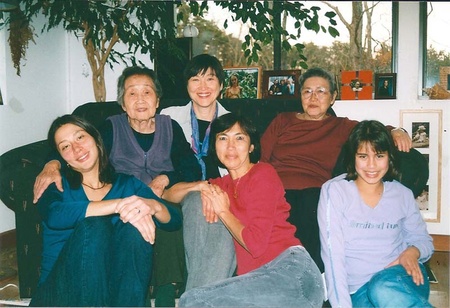When I walk in the park near my house in Palo Alto, California some of the elderly Chinese and Indians smile at me and my dogs while others are indifferent or scared. Like many immigrants who come here later in their lives to join children and grandchildren they are spending their last years far from their “home” countries. Their transnational families bring them here hoping that it is the best place for aging and dying.
When we realized that she could no longer live alone in Japan, we brought Obaachan to the U.S. to die. No one actually said that but we all knew it was true. After all, grandma was 99 and how many more years could she possibly live? Better to die among those she loved the most, we reasoned. She could pass her few remaining years in peace and would be able to die surrounded by her only child and grandchildren.
Since she had never actually lived anywhere else in the world for 99 years we decided it would be best to call it a trial and tell her that she could return to Japan if she decided that it was the best thing to do. But since she could no longer live alone, should she decide to go back she would have to enter a nursing home there. She moved in with my mother and older sister in Massachusetts. I was in Tokyo.
Days passed and tensions mounted. As the time approached for a decision to be made I received a phone call from my older sister who does not speak Japanese, requesting that I ask Obaachan what she wants to do.
“Okay,” I said, and when the phone was passed, asked, “What do you want to do Obaachan?”
“I think I should go back.”
She gave the phone to my sister and I translated into English.
“She thinks she should go back.”
This answer did not satisfy my sister who insisted, “I want to know what she wants to do, not what she thinks she should do.”
“Okay, let me ask her again.”
“Big sister wants to know what you want to do Obaachan.”
“Well, I think your mother wants me to go back.”
I translated this too.
My sister said, “That might be true but I want to know what she wants to do.”
“Okay, I’ll try again.”
“Obaachan, don’t worry about what you think mom wants, what do you want to do?”
“I think your sister’s husband is not comfortable with me here.”
I translated this too, but my sister said, “Tom’s fine with whatever we decide. What does she want to do?”
“Sister says her husband is fine with you here. She wants to know what you want to do.”
“It’s probably better for everyone if I go back.”
My sister was getting a little frustrated. “I’m not asking her that. I want to know what she wants. Tell her that if she wants to stay, I will take care of her.”
“Big sister says if you want to stay she will take care of you.”
“I appreciate it, but I should probably go back.”
“She thinks she should go back,” I told sister, realizing we were back where we started.
She replied, “I just want to know what SHE wants to do.”
I was also exasperated, “I know you do, but maybe she just can’t answer your question in the way you want her to.”
There was a silence, then my sister said, “Okay, I understand.”
Obaachan went back to Japan a month later. She moved into the nursing home without complaint. She is still there today. Would she have been happier in the U.S.? I don’t know. There were tensions with my mother, and there could have been incredible problems with health insurance that would have exhausted all her savings before the bills were passed on to us. And how would she have communicated with doctors, nurses and caregivers?
Though I feel sad and imagine that she is lonely this is the way she is living out her last years. Maybe she really did want to come home to Japan, where she was born, where her mother died, where she herself wanted to die. Perhaps she could never express her desire, but perhaps she needed to be where things were familiar—the way things looked, smelled, the natural world of home. Maybe she couldn’t stand losing memories.
It was her choice, I say to comfort myself. But what does this mean? Could she ever really choose what she wants—a woman raised at a time and place in which a woman’s desires did not matter, a woman raised in a society in which she could only see herself in a contextual web of relationships? When we asked her “What do you want to do?” could she possibly see her wishes simply as personal, individualistic desires? What Obaachan wants and has always wanted is what is best for all her loved ones.
* This article was originally published on the author’s website on June 29, 2012.
@ 2012 Stephen Murphy-Shigematsu






